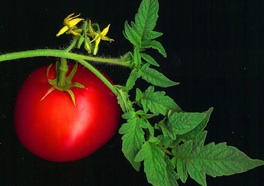
Features
Production
Research
Managing, minimizing the risk of vine decline
July 12, 2011 By Agriculture Adaptation Council
 July 12, 2011 – During
July 12, 2011 – During
the 2009 growing season, vine decline began to take a commercially significant
toll on processing tomato production in Ontario. While the actual impact
of the vine decline has not been documented, sufficient concerns about this
problem have been raised by both growers and processors.
@font-face {
font-family: “Times New Roman”;
}@font-face {
font-family: “Verdana”;
}p.MsoNormal, li.MsoNormal, div.MsoNormal { margin: 0in 0in 0.0001pt; font-size: 16pt; font-family: Times; }div.Section1 { page: Section1; }July 12, 2011 – During
the 2009 growing season, vine decline began to take a commercially significant
toll on processing tomato production in Ontario. While the actual impact
of the vine decline has not been documented, sufficient concerns about this
problem have been raised by both growers and processors.
 |
|
Vine decline is thought
to be the result of several causal agents and environmental factors interacting
with each other. One of the soil-borne fungi associated with this disease
complex has been experienced for many years in other processing tomato regions
of the world. Corky root rot disease, which appears to be the predominant
causal agent, is more severe in cooler soils. Vine decline’s presence in Ontario
fields, on a commercially significant scale, has been observed only recently.
“In 2009, the cool soil
temperatures at planting time may have increased the incidence of corky root
rot and subsequent vine decline,” says Phil Richards and Karl Evans, co-chairs
of the Ontario Tomato Research Institute (OTRI). “This resulted in significant
economic implications for the entire processing tomato sector.”
To respond to this
issue, the OTRI initiated a research project to pilot a series of field
experiments to examine possible remedies. With $224,789 in funding from the
Canadian Agricultural Adaptation Program (CAAP), the OTRI has assigned Dr.
Frank Marks, research advisor of the Ontario Processing Vegetable Growers, to
coordinate multiple projects investigating vine decline.
One of these projects is
being led by Steve Loewen, professor and horticultural crop breeder with the
University of Guelph’s Ridgetown Campus, and Dr. George Lazarovits, a soil
ecologist with A&L Canada Biologicals. They are grafting tomato plants to
screen for differences in root characteristics. Dr. Lazarovits is also
developing a screening test, which will allow growers to distinguish at-risk
fields based on results from soil samples.
“The reduction of vine
decline will contribute to consistent yields of high-quality processing
tomatoes, which will be beneficial for both growers and processors,” says Jim
Rickard, Agricultural Adaptation Council (AAC) chair. “This project will
contribute to the long-term competitiveness and sustainability of Ontario’s
processing tomato sector.”
Print this page